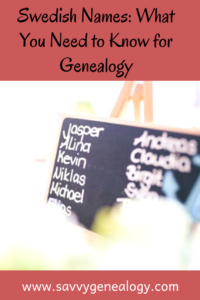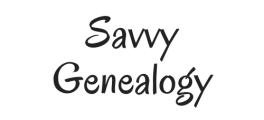Swedish Names: What You Need to Know for Genealogy
Have you ever wondered how to research your Swedish ancestors when their names are so different? Which one is the correct ancestor when they reuse names? Good questions! I’ve wondered these same things. So I’m here to shine some light on the different ways the Swedes use their names.
History of Swedish Names
Long ago, the Swedish people used only one name to identify themselves. Later they ran into the problem of having multiple people with the same name living in the same town. So they started identifying each other by saying the “son” or “daughter” of the father. For example, they would say Peter Andersson, which is Peter the son of Anders.

This solved the problem for many years until they started having lots of Peter Anderssons in the same town. Then they started adding “addresses” by adding their farm names to their surnames. Now, they could not only know someone by their name, but also their address. So now Peter Andersson was known on many records as either Peter Andersson Vikedal, Peter Vikedal, or Vikedal Peter.
Then in the 20th century, the government passed a law that each person had to pick a permanent surname. The family usually decided together on the surname, but many records show different surnames for the same family. This law took awhile to get going with the nobility starting it earlier than the farmers and peasants. But it eventually caught on and in today’s world we see Swedish names with permanent surnames.
Naming Patterns in Records
You do need to know the history so that you can research the records. Because you may be researching in the early 19th century and run across many Anderssons and Andersdotters, but when you research in the 20th century you could find all Andersons no matter the gender.
So here’s a rule of thumb for seeing if the ancestor is Swedish, Norwegian, or Danish based on the way they spell their surname in records.

- Swedish= ‘son, ‘dotter
- Norwegian= ‘sen, ‘datter
- Danish- ‘sen, ‘datter
However, these patterns aren’t set in stone. You will still find ‘son and ‘dotter’ in Norwegian and Danish records depending on who wrote it and in what century. So if you find an Andersson in a Norwegian record it doesn’t mean that’s the wrong or right ancestor. It just means the person who wrote it could have been Swedish.
Another fun pattern you see in Swedish records is naming the children based on the birth order. You will also find that even Swedish American immigrants followed this pattern in American records at times. If you’re looking for a fun activity to do with your kids, then use your current family’s names and plug in this naming pattern. It helps them relate to their Swedish ancestors a little more.
- The first son named after the father’s father.
- The second son named after the mother’s father.
- The third son named after the father.
- The fourth son named after the fathers eldest brother.
- The first daughter named after the mother’s mother.
- The second daughter named after the father’s mother.
- The third daughter named after the mother.
- The fourth daughter named after the mothers eldest sister.
How to Find the Correct Ancestor
So what if you find a Peter Andersson on a record and you don’t know if that’s your ancestor or not? Here are a few tips…

- Is the birth year and place the same as your ancestor
- Is the place name that appears before or after their name the same one on your other records
- Does it make sense with what you know of your ancestor’s normal patterns of life, migration, occupation, family, etc.
- Research that name until you find proof in the records that they are not your ancestor.
Last Thoughts on Swedish Names
When you take the time to understand how Swedish names work, then you will be able to find more of your ancestors. Knowing your ancestors helps you feel closer to them. Feeling closer to them helps you remember them better and want to share their stories with others. So what’s in a name? Everything!
And as always…good luck and happy hunting!
Tiffany
P.S. Related Reads
naming patterns, Sweden research, Swedish names, swedish naming patterns
